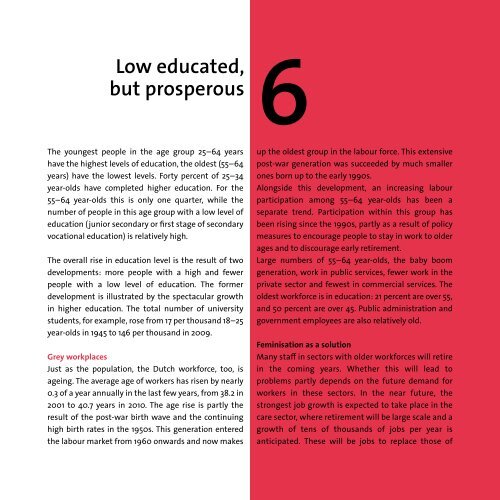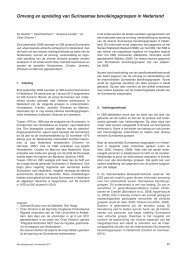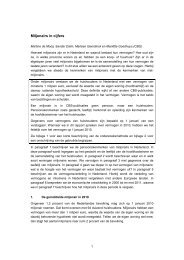Babyboomers in the Netherlands: What the statistics say - Cbs
Babyboomers in the Netherlands: What the statistics say - Cbs
Babyboomers in the Netherlands: What the statistics say - Cbs
Create successful ePaper yourself
Turn your PDF publications into a flip-book with our unique Google optimized e-Paper software.
Low educated,<br />
but prosperous<br />
6<br />
The youngest people <strong>in</strong> <strong>the</strong> age group 25–64 years<br />
have <strong>the</strong> highest levels of education, <strong>the</strong> oldest (55–64<br />
years) have <strong>the</strong> lowest levels. Forty percent of 25–34<br />
year-olds have completed higher education. For <strong>the</strong><br />
55–64 year-olds this is only one quarter, while <strong>the</strong><br />
number of people <strong>in</strong> this age group with a low level of<br />
education (junior secondary or first stage of secondary<br />
vocational education) is relatively high.<br />
The overall rise <strong>in</strong> education level is <strong>the</strong> result of two<br />
developments: more people with a high and fewer<br />
people with a low level of education. The former<br />
development is illustrated by <strong>the</strong> spectacular growth<br />
<strong>in</strong> higher education. The total number of university<br />
students, for example, rose from 17 per thousand 18–25<br />
year-olds <strong>in</strong> 1945 to 146 per thousand <strong>in</strong> 2009.<br />
Grey workplaces<br />
Just as <strong>the</strong> population, <strong>the</strong> Dutch workforce, too, is<br />
age<strong>in</strong>g. The average age of workers has risen by nearly<br />
0.3 of a year annually <strong>in</strong> <strong>the</strong> last few years, from 38.2 <strong>in</strong><br />
2001 to 40.7 years <strong>in</strong> 2010. The age rise is partly <strong>the</strong><br />
result of <strong>the</strong> post-war birth wave and <strong>the</strong> cont<strong>in</strong>u<strong>in</strong>g<br />
high birth rates <strong>in</strong> <strong>the</strong> 1950s. This generation entered<br />
<strong>the</strong> labour market from 1960 onwards and now makes<br />
up <strong>the</strong> oldest group <strong>in</strong> <strong>the</strong> labour force. This extensive<br />
post-war generation was succeeded by much smaller<br />
ones born up to <strong>the</strong> early 1990s.<br />
Alongside this development, an <strong>in</strong>creas<strong>in</strong>g labour<br />
participation among 55–64 year-olds has been a<br />
separate trend. Participation with<strong>in</strong> this group has<br />
been ris<strong>in</strong>g s<strong>in</strong>ce <strong>the</strong> 1990s, partly as a result of policy<br />
measures to encourage people to stay <strong>in</strong> work to older<br />
ages and to discourage early retirement.<br />
Large numbers of 55–64 year-olds, <strong>the</strong> baby boom<br />
generation, work <strong>in</strong> public services, fewer work <strong>in</strong> <strong>the</strong><br />
private sector and fewest <strong>in</strong> commercial services. The<br />
oldest workforce is <strong>in</strong> education: 21 percent are over 55,<br />
and 50 percent are over 45. Public adm<strong>in</strong>istration and<br />
government employees are also relatively old.<br />
Fem<strong>in</strong>isation as a solution<br />
Many staff <strong>in</strong> sectors with older workforces will retire<br />
<strong>in</strong> <strong>the</strong> com<strong>in</strong>g years. Whe<strong>the</strong>r this will lead to<br />
problems partly depends on <strong>the</strong> future demand for<br />
workers <strong>in</strong> <strong>the</strong>se sectors. In <strong>the</strong> near future, <strong>the</strong><br />
strongest job growth is expected to take place <strong>in</strong> <strong>the</strong><br />
care sector, where retirement will be large scale and a<br />
growth of tens of thousands of jobs per year is<br />
anticipated. These will be jobs to replace those of
















